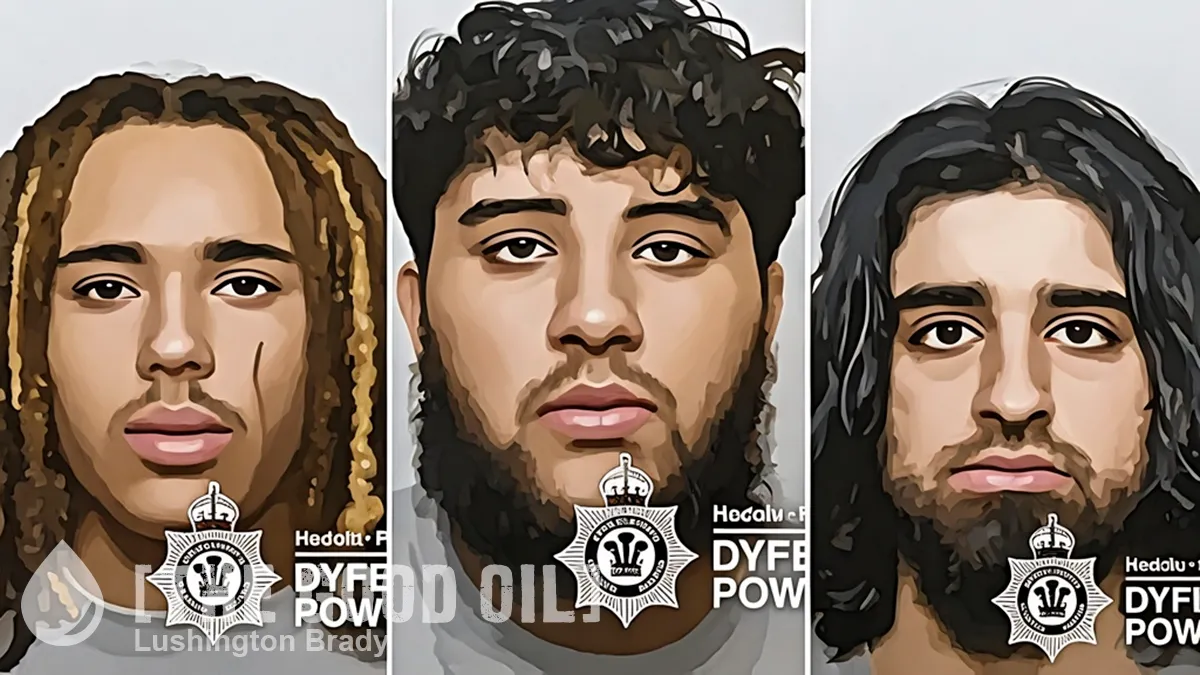Table of Contents
[Editor’s note: This article has been previously published, but was unfortunately in the wrong template. Dr Lion Red will provide an updates for readers in a few of days and has asked that we republish this as a precursor.]
You may have noticed the lack of a Letter from the North recently, so I hope the following explains.
It is very difficult now to understand what I can and can’t write because of the plague of non-crime hate incidents (NCHI) being investigated by the police. If someone complains about something that has been said, written, broadcast or otherwise communicated, then the police can investigate.
Allison Pearson, a well-known journalist was visited by Essex police on the morning of Remembrance Sunday regarding a NCHI that was a year old. She wasn’t told any details and there was confusion with the police referring to the victim (it should have been ‘the complainant’), which is pre-judging the complaint.
Essex Police have confirmed they are investigating alleged criminal racial hatred after columnist Allison Pearson said she was “dumbfounded and upset” when she was questioned by police last week.
Ms Pearson said she was being investigated over a year-old deleted post online, claiming the investigation was related to a Non-Crime Hate Incident (NCHI). This refers to an act which is prejudiced towards a person with a particular characteristic but is not illegal.
Her claims have gained widespread attention and attracted significant criticism towards Essex Police, including from leader of the opposition Kemi Badenoch, who said the police should stop “wasting police time on trivial incidents”.
Ms Pearson claimed on X on Saturday morning that Essex Police had “upgraded the accusation from Non-Crime Hate Incident to offence under the Public Order Act”.
(The Independent, 14 November 2024.)
It then got very confusing turning into a ‘he said, she said’ argument, with Essex police saying they were investigating a crime of inciting racial hatred. So, there was claim and counter claim.
It emerged that Essex Police had set up a “gold group”, usually reserved for major crimes, to handle its controversial investigation. The purpose of gold groups is to ensure the “effectiveness of ongoing police response”, and they are usually led by assistant chief constables or higher.
His Majesty’s Inspectorate of Constabulary and Fire & Rescue Services say a gold group is set up to “improve the police response to an incident, crime or other matter”.
Its guidance states: “This involves bringing together appropriately skilled and qualified interested parties who can advise, guide or otherwise support the management of an effective response to the identified incident, crime or other matter.”
(GB News, 15 November 2024)
However, it is strange that, after all the media coverage and adverse publicity, on 21 November 2024 the Crown Prosecution Service confirmed that no action would be taken against Ms Pearson.
The Free Speech Union (FSU) has just learnt that Essex Police have decided to take no further action against Allison Pearson, following the intervention of Luke Gittos, a top criminal lawyer paid for by us.
As widely reported, two police officers turned up on the Telegraph columnist’s doorstep at 9:40am on Remembrance Sunday to question her about a tweet, although they wouldn’t say which one or who had complained.
It later emerged it was more than a year old and had been deleted by her the next day.
In the offending tweet, Allison accused the Metropolitan Police of having double standards because they’d refused to pose with her holding up a British Friends of Israel flag but had posed with a couple of South Asian men holding up a green and red flag whom she described as “Jew haters” – and she attached a picture.
When she learned it was taken a year earlier in Manchester, not London, and the flag holders were in fact delegates of Imran Khan’s political party, not Hamas-supporting pro-Palestinian protestors, she deleted it.
The post was reported to the Metropolitan Police as a potential breach of the Malicious Communications Act in November last year. The case was then passed to Sussex Police, which marked it as a possible non-crime hate incident (NCHI).
Sussex Police passed it to Essex, where Pearson lives.
It is understood Essex made two assessments of the complaint before opening an investigation under section 17 of the Public Order Act 1986, relating to material allegedly “likely or intended to cause racial hatred”.
The officers who attended Allison’s home told her that she’d need to make an appointment to go to the local police station, where she would be interviewed “under caution”.
Allison is a member of the FSU, and we immediately got Luke Gittos on the case. Thanks to his intervention, Essex Police have decided to drop the whole thing.
Chief Constable Mark Hobrough, the National Police Chiefs’ Council hate crime lead, will now conduct an independent review of the force’s handling of the case.
Speaking following the force’s announcement, Toby Young, head of the FSU and a friend of Allison’s, said: “Essex Police should never have investigated this tweet in the first place. It didn’t come close to being a criminal offence, which they’ve now effectively acknowledged. I hope the public outcry over this huge waste of time and resources means Essex Police will go back to policing our streets, not our tweets. It’s not their job to investigate newspaper columnists for wrongthink.”
Writing on X, Luke Gittos said: “I am very [pleased] to get the right result for Allison Pearson in this ridiculous case, with support from the Free Speech Union. We must use this win to turn the tide against policing speech. Enough is enough.”
If you think there’s a risk the police will turn up on your doorstep about a social media post, join the FSU. We’ll have your back.
(The Free Speech Union, 21 November 2024)
Just to show how bad things are getting, a nine-year-old boy was questioned by police for a NCHI for calling a schoolmate “a retard”. If that is recorded as such, at the discretion of the police, it will stay on his police file for life. A NCHI can even be recorded against someone without their knowledge.
Police officers in Lancashire were instructed to record non-crime hate incidents even when victims themselves did not believe one had occurred, according to internal briefing documents.
The guidance, issued by Lancashire Constabulary in April 2019 and released under freedom of information laws, stated that any interaction could be logged as a hate incident if anyone perceived it as motivated by prejudice or hostility.
The briefing document provided specific “investigation tips” for officers, asking them to consider if anyone perceived the incident to be motivated by prejudice or hostility.
Officers were told that victims “may not understand what a hate crime is or may have become used to being verbally abused”.
The guidance even permitted recording incidents without evidence of hostility or prejudice.
“Where no evidence of hostility or prejudice exists, explain where the perception comes from,” the briefing stated.
Officers were instructed to “record the crime” and add relevant hate classifications, along with their perception and rationale.
(GB News 27 November 2024)
Police have recorded a bizarre non-crime hate incident after a woman with an Italian surname complained about soiled underwear being hung on a neighbour’s washing line following England’s defeat to Italy in the Euro 2020 final.
The unusual case in North Wales saw the complainant report that “known offenders” had displayed large, dirty underpants for over two months, reports The Sun.
The woman believed the underwear display was targeted at her due to her Italian heritage and was connected to England’s loss in the penalty shootout at Wembley.
According to North Wales police records, the complaint stated: “Known offenders have hung a very large, soiled pair of underpants on their washing line. They have been there for over two months.”
The police summary continued: “The [injured party] believes that [they] are aimed at her because she has an Italian surname, and it is in regards to the football.”
The incident was recorded under the Police, Crime, Sentencing and Courts Act 2022 as part of efforts to track cases “clearly motivated by intentional hostility” that could significantly escalate.
The case emerges amid growing concerns about the police recording of non-crime hate incidents (NCHIs), with even the country’s top prosecutor expressing doubts. Stephen Parkinson, director of public prosecutions, recently told the Times Crime and Justice Commission: “I had to look up what on Earth the term meant – I was puzzled by it.”
He added: “Even within the police service there has been some surprise at the level of non-crime hate incidents that have been investigated.”
(GB News 23 November 2024)
Apparently, the police activities can also be triggered by complaints from overseas.
A prominent feminist writer and gender-critical activist was visited by police after a “transgender man” from Holland complained about one of her tweets.
Julie Bindel was told by two Met Police officers that she was under investigation for a “hate crime” in 2019.
The officers told her that a transgender man from the Netherlands had reported one of her posts, however they would not reveal which post, who the complainant was, or what type of hate crime was being investigated.
Bindel wrote in the article that the situation she had faced was “Orwellian” and said she refused to cooperate and questioned the officers about the legal jurisdiction.
She was asked to voluntarily attend the local police station to make a statement, which she refused to do, saying she didn’t even know what she was being accused of.
“I had better things to do,” the journalist wrote. “The officers left looking a little bewildered. I did have a sense that they understood what a ridiculous mission they have been sent on. I advised that they could better use their time investigating rape and domestic violence.”
She added: “I know the law on these issues and am well aware they had no chance in getting the Crown Prosecution Service to press charges.”
Bindel received a call the next day telling her that the investigation had been dropped.
She admitted that she was left disappointed, and said she’d hoped she would end up in court so her “friends and colleagues would protest outside of the court and use it as a way to educate the public about this Orwellian state of affairs”. (Source GB News 18 November 2024)
In 2014, the College of Policing came up with the concept of the NCHI in its Hate Crime Operational Guidance (HCOG). As defined in this document, an NCHI is any incident perceived by the victim or any bystanders to be motivated by hostility or prejudice to the victim based on a ‘protected’ characteristic (race or perceived race, religion or perceived religion, and so on).
“Perceived” is the operative word here, since as the guidance goes on to note: “The victim does not have to justify or provide evidence of their belief, and police officers or staff should not directly challenge this perception. Evidence of the hostility is not required.”
In other words, according to the College of Policing, the recording threshold for an NCHI is that someone had taken subjective offence to something perfectly lawful that someone else has said or posted online, whether it’s directed at them or not. Talk about a gold-embossed invitation for people to engage in performative offence-taking!
Most people don’t realise just how many NCHIs have been recorded in England and Wales since then. In the five years following the publication of the CoP’s guidance, we estimate more than 250,000 NCHIs have been recorded by police forces in England and Wales. That’s an average of 66 per day. Little wonder, then, that the police don’t have time to send an officer round to your house if you report a burglary. (Between 2015 and 2021, 964,197 domestic burglary investigations ended without a suspect being identified).
It should be stressed that we’re not talking about attempts to stir up hatred on the grounds of race, religion or sexual orientation or people hurling racial abuse at football players on Twitter. Those are actual hate crimes, prohibited by law. NCHIs refer specifically to “non-crimes”, i.e., comparatively trivial episodes that, for the most part, the police should not be wasting their time on.
In June 2022, Wiltshire Police opened a file when an 11-year-old boy was called “shorty” and “leprechaun” in the street by another boy.
Hampshire Police dispatched five officers to arrest army veteran Darren Brady following a complaint that he’d reposted a meme created by Laurence Fox depicting the Pride flag as a swastika in an unsubtle attempt to highlight the authoritarian way in which the LGBTQ+ agenda is sometimes promoted. As one officer told him when he was being handcuffed: “Someone has been caused anxiety based on your social media post, that is why you have been arrested.”
Last year, the FSU wrote to West Yorkshire Police, urging them to delete the NCHIs from the records of four pupils at a school in Wakefield who were suspended over minor, accidental damage caused to a copy of the Quran. For this, the four students were suspended, and the police were called in. At a meeting with irate “community leaders” at a local mosque, Chief Inspector Andy Thornton – who was leading the investigation into this dreadful crime – said the students’ treatment of the holy book has been recorded as an NCHI.
Last August, the then Welsh Secretary, David TC Davies, faced a police investigation over an allegedly “racist” campaign leaflet about a proposed new traveller site in his constituency.
After Mr Davies raised his concerns about the inadequacy of a council consultation about the site in a flyer sent to constituents in July, a complaint of discrimination was made. Gwent Police later confirmed it was reviewing the “impact” of the leaflet’s content “on the gypsy and traveller and settled communities in Monmouthshire” on the grounds that it may represent a non-crime hate incident (or NCHI).
And so on and so forth.
Under the Police Act 2014, police are required to release any information “the chief officer reasonably believes to be relevant for the purpose” of a background check. In other words, police may release NCHI logs to prospective employers performing background checks on prospective employees. How often police actually relay this information is unclear, but the threat is chilling enough.
As Lord Macdonald QC, the former Director of Public Prosecutions put it in the Times “NCHIs have consequences. They are not anonymised. They sit forever against the names of the alleged perpetrators without any real investigation or right of appeal… We need hardly imagine what an HR manager would make of a job applicant with a police history of hate.”
(The Critic, 20 August 2024)
The police have weaponised NCHIs and it is the process that they are using apparently to punish people.
This explains why every time I write a piece and submit it to The Good Oil, I am walking on eggshells.
For example, if I wrote that I am fed up with travellers setting up camp on common ground I run the risk of being reported for a NCHI.
To quote the infamous Katie Hopkins, welcome to “batshit bonkers Britain”.









